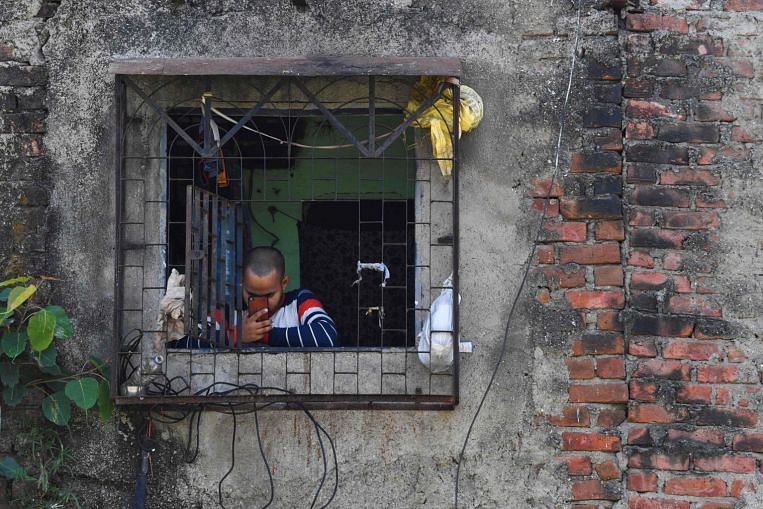Loan application companies in India accused of harassment during pandemic; new rules imposed, Southeast Asian News and Top Stories
BANGALORE – Mrs. Chetna Kadu panics every time her phone rings. For three months now, she has been receiving calls from unknown numbers at all hours of the day and night and her WhatsApp is inundated with non-grammatical messages in all caps threatening to send her to jail.
All are demanding immediate repayment of a loan of 15,000 rupees (S $ 276).
“How can I repay the loan when I haven’t received my salary for three months? Asked the 32-year-old accountant of a restaurant in Mumbai.
As hotels and stores across the country closed on March 24 and economic activity collapsed under a two-month lockdown ordered by the Indian government to fight the Covid-19 pandemic, Ms. Kadu, like millions of Indians, lost her job. With no income and a sick mother to care for, she was forced to dip into her meager savings.
Five days after confinement, a loan of 15,000 rupees she took out from Cash Bean, an online lender, has expired. Entering an interest of 33% per annum, she owed the lender 16,737 rupees. As if that wasn’t enough, she has had to endure sleepless nights and incessant phone calls ever since.
During a call, an abrasive representative for Cash Bean accused Ms Kadu of using the lockdown as “an excuse.” Hundreds of people like Ms Kadu have taken to social media in the past three months to complain about such cyberbullying by app-based lenders. They say debt collectors swear at repeated calls, text abuse, send false legal opinions and police reports, and call borrower contacts to shame them.
India has over 430 loan apps whose names are puns on money, like Cash Bean, MoneyMore, CashBus, Kissht, CashMama, iCredit, FlashCash, iRupee, mPokket, KreditBee and HappyLoan. They offer “hassle-free” short-term, high-interest loans, starting as low as Rs 1,500, to individuals and small businesses.
To lend, applications must be linked to a non-bank financial corporation (NBFC) registered in India. But the apps themselves are often start-ups with skeletal teams and no regulatory oversight.
Most online lenders charge 25-40% interest (banks charge 12-20%). Their websites claim a repayment term of 30 to 90 days, but over 60 emails and screenshots reviewed by borrowers from 14 different apps showed repayment terms of seven or 15 days.
After downloading the app, borrowers submit their unique digital ID or Aadhaar number, tax ID, cell phone number, and a selfie or video for verification. They should give the app full access to their contacts and call logs.
“In less than half an hour I had the money,” said Ms. Priyanka Sharma, who sells cosmetics in Mumbai and took 6,000 rupees from iCredit on March 15. Unable to repay the sum after losing her job, she received harsh calls and is now considering pledging gold to end her ordeal.
“Despite the cost and the risks, these apps are often the only option for low-income Indians and students who will not get unsecured bank loans,” said Ms Mrin Agarwal, founder of FinSafe, an organization of financial education. Many borrowers take loans from multiple apps and use one to pay off the other.
During the pandemic, there was a sharp increase in borrowing and defaults.
“Compared to the period before confinement, delinquency in April, May and June is 10 times higher. We therefore stopped disbursing new loans around the beginning of April and have only started modestly now, ”said Ms. Ilica Chauhan, Vice-President. President, Compliance and Partnerships of PC Financial Services, the NBFC under which Cash Bean is registered.
-
Loan applications in India
HIGH INTEREST, SHORT TERM
Amount: From 1500 rupees (S $ 28)
Duration: 7 to 90 days
Interest: 25-40 percent per year
Processing fee: 15 to 20% of the loan amount
Service tax: 18% of the loan amount
ELIGIBILITY
Digital identification
taxpayer ID
Selfie / Video
phone number
Access to all phone contacts, call logs, SMS
BORROWER PROFILE
No credit history
21-40 years
Uses an Android phone
Active on social networks
India’s central bank has asked lenders to offer a moratorium on loan payments until August 31, 2020. But Ms Kadu was denied an extension.
“In real cases, we grant moratoriums. But there are many who have cash flow but have no intention of repaying,” Ms. Chauhan said.
“We investigated a case of bad harassment in April and terminated the outsourced debt collector. We also trained our agents to follow the code of conduct,” she added.
Representatives for Moneed and Kisht did not respond to Straits Times emails seeking comment.
Many borrowers are now receiving threats and abuse.
“First-time borrowers don’t have a credit history, so apps access their contacts apparently to judge creditworthiness. But the downside is that this leads to harassment and invasion of privacy.” , said Mr. KJ Shashidhar, financial technology expert at Observer Research. Foundation.
Mr. Akash Kumar, 24 from Raigarh, said FlashCash agents called his worker father and several friends. “They told them that I ran away with the money. I was so humiliated and sold my phone to pay back 3,000 rupees,” he said.
On June 25, India’s central bank announced stricter standards for digital platforms, responding to complaints about “exorbitant interest rates, non-transparent interest calculation methods, severe clawback measures, unauthorized use of personal data and bad behavior “.
App companies are now required to disclose the names of the NBFC they partner with, issue loan sanction letters on NBFC letterhead, and adhere to fair practices while collecting dues.
Experts say the current pandemic crisis is a good time to rethink the lending model of fintech companies.
“Do apps need more regulation? Or should they change some practices? Mandates of fifteen days and more than 30% interest are designed to defeat the borrower, ”said Mr. Shashidhar.
Ms Agarwal hopes regulators will do more, like cap interest rates. But much of the answer, she believes, lies in educating investors intensively about the risks involved.

